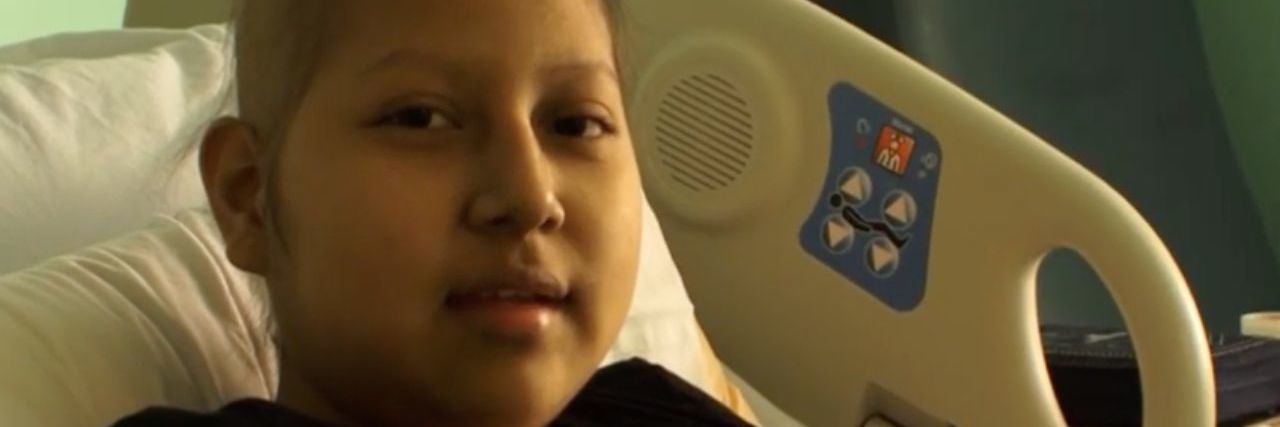A teenager underwent treatment for leukemia alone for four months while her mother was prevented from crossing the border from Mexico to the U.S., the latest in a series of health-related challenges faced by immigrants and migrants at the border.
According to a video released earlier this month by the migrant and refugee advocacy group Solidarity Now, 14-year-old Ixcell Perez was born in Raleigh, North Carolina. She and her mother, Dalia Perez, moved to Mexico in 2010 when Dalia’s visa expired. But Ixcell was diagnosed with leukemia earlier this year, and as Dalia explained in the video, “The doctor told me I should hurry. Or there would be no tomorrow.”
“The doctor said your daughter is a U.S. citizen. That she would fill out all the documents she would need to cross the border into the United States,” Dalia said. “And we came here to the border in Tijuana.”
Leukemia is cancer of the tissues and cells that form blood. It begins in the bone marrow, then becomes a type of leukemia cell which grows and multiplies, replacing normal blood and marrow cells. There are several different types of leukemia which progress at different rates. It’s unclear exactly which type of leukemia Ixcell has.
Once they arrived at the San Ysidro Port of Entry in San Diego, Dalia said she and Ixcell had their luggage taken away from them, and they were given some crackers and water and locked in a cold room.
“It was so cold and my daughter was feeling so sick,” Dalia said. “I pounded on the door and shouted for them to open it but no one came. No one listened to me. My child was so thirsty but no one would listen to me.”
The next day, agents asked Dalia if she was seeking political asylum. She told them she was just there because of her daughter’s illness. Eventually, a relative living in the U.S. went to the border and got Ixcell across, but Dalia was denied again.
Ixcell received treatment at Duke University Medical Center in North Carolina while Dalia was stuck in Mexico. U.S. Customs and Border Protection told ABC11 that Dalia was previously denied a U.S. non-immigrant visa due to past immigration violations related to her being in the country illegally more than once, which resulted in a 10-year ban on re-entering the U.S.
“It’s not easy to be here without her,” Ixcell said from her hospital bed in the Solidarity Now video. “It’s not easy to have her so far away. I had not prepared myself to be without her. Yes, I want her to be here to take care of me.”
This news is the latest in a series of developments that put immigrants dealing with health challenges at risk. Earlier this month, the Trump administration ended a policy that permitted undocumented immigrants to stay in the U.S. if they were receiving life-saving medical treatments. Letters sent to families impacted by this change said they had to leave the U.S. within 33 days or face deportation, according to The Independent. They can now apply for a deportation deferral through Immigrant Customs and Enforcement (ICE), but the letters didn’t mention that option.
Also earlier this month, a class action lawsuit filed on behalf of 15 ICE detainees claimed that people in ICE custody were denied healthcare and accommodations for their disabilities. Detainees said they were denied insulin, an Epipen, treatment for a brain parasite and surgery, forced to spend months in isolation while living with mental illness, and prevented from using mobility devices.
Solidarity Now, along with church groups, North Carolina Congressman David Price, Ixcell’s oncologist, and the nonprofit Miles4Migrants helped advocate for the Perez family. On Tuesday, Dalia was granted a temporary humanitarian waiver, which allowed her to enter the U.S. and join her daughter in North Carolina.
ABC11 captured footage of Ixcell and Dalia meeting at the airport.
A mothers embrace with her daughter. Ixcell and dalia together again. #ABC11 pic.twitter.com/8b2lSleo1b
— Josh Chapin (@JoshChapinABC11) August 29, 2019
It’s unclear how long Dalia will be allowed to stay in the U.S., and Ixcell is currently receiving outpatient treatment for her cancer.

